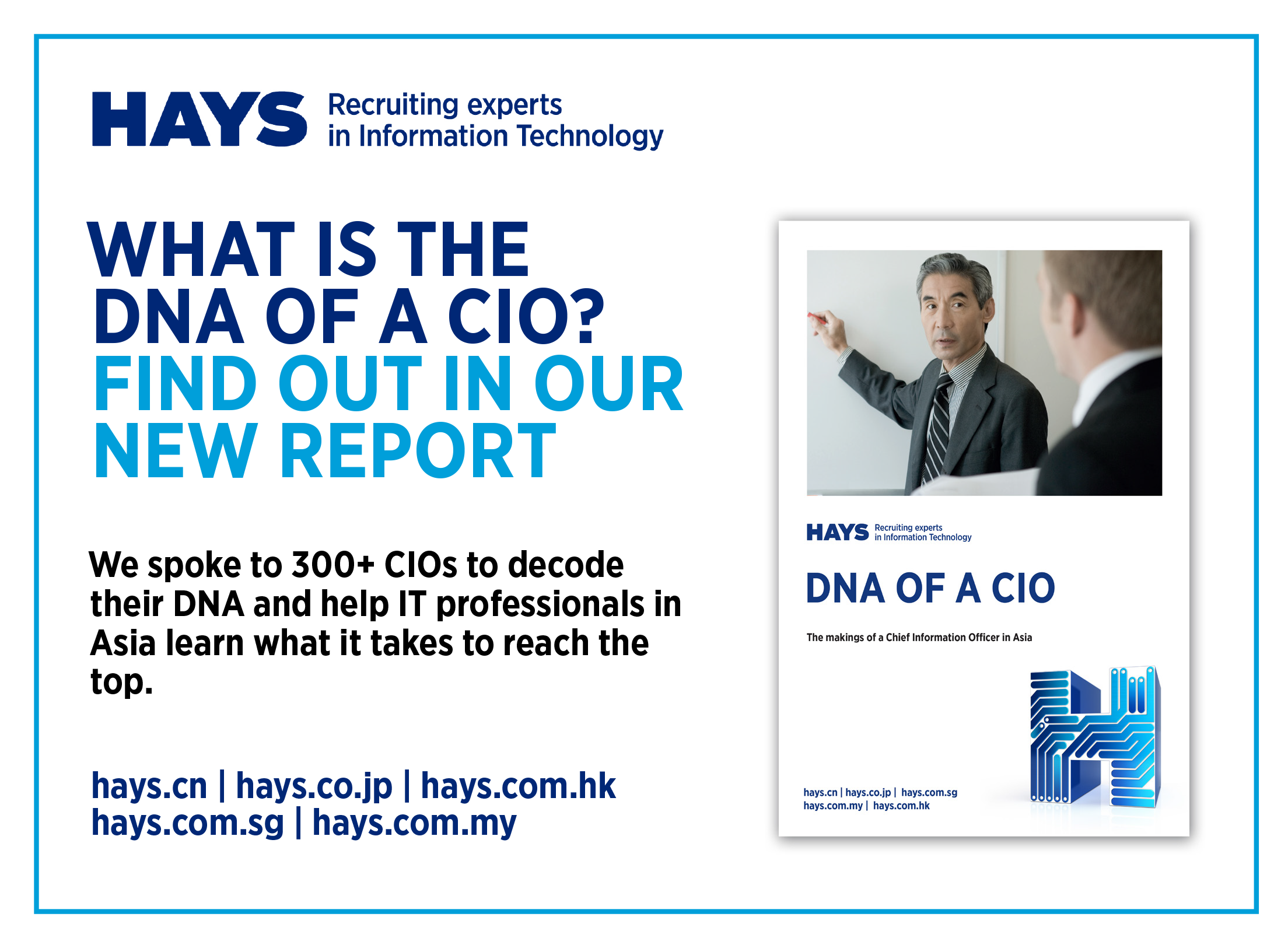Decoding what it takes to become a CIO in Asia

Despite being relatively new, the role of Chief Information Officer is fast establishing itself as a key part of the executive suite.
The role faces an extremely fast-changing environment amid the speed of technology advancements, which leaves many aspiring CIOs wondering which direction they should take in their career.
Recruiting experts Hays spoke to 307 IT leaders across Asia through in-depth one-on-one interviews, to uncover what makes a successful CIO.
In its ‘DNA of a CIO Asia’ report, Hays found that most CIOs had IT related university degrees, with 62 per cent possessing a degree in Information Technology, Computer Science or Systems.
Whilst a solid technical foundation is a key building block to becoming CIO, keeping abreast of rapidly changing technology advancements was seen to be a key career development step that 49 per cent of CIOs take.
But being CIO is not only about the technical knowledge, it’s also about being commercially involved in the business and having a multitude of business skills. The CIOs Hays surveyed agreed that strategic planning is the most important skill a CIO must possess. This was followed by people management and stakeholder engagement.
According to Christine Wright, Managing Director of Hays in Asia, “Today’s IT leaders are not just classed as technical support, but rather people who can enhance the strategic direction of entire organisations by putting technology at the heart. Successful CIOs spend time working across the wider organisation in order to act as an effective interface between IT and the business to deliver critical outcomes.”
Some of the ways CIOs have developed these skills include further education, with 23 per cent having obtained an MBA. The CIOs interviewed also spoke of international experience as a key contributor. In fact 44 per cent of the CIOs interviewed had gained international experience and 70 per cent of those found this to be of considerable benefit to their career.
“CIOs have a genuine desire to enhance organisations, and are in a unique position to act as a link between business strategy and IT strategy”, adds Christine. Whilst there is no ‘one size fits all’ approach to becoming a CIO, there are certainly common traits that aspiring CIOs can strive towards.
Tips for aspiring CIOs, according to ‘Hays DNA of a CIO Asia’ report:
Build a solid technical foundation:
- 62% have a degree in Information Technology, Computer Science or Systems
- 45% have a Master’s degree and 23% an MBA
- 41% of CIOs hold IT certifications or have undertaken additional IT qualifications
- 78% have always work in IT
Keep on top of IT related developments:
- 19% state one of their greatest professional challenges in the upcoming year is to keep up-to-date with new technology
- 49% say that keeping up-to-date with the latest industry changes is one of the career developmental steps they’ve taken in the last two years
- 34% cite keeping up-to-date on tech advances as one of their top three tips for the next generation of CIOs
Develop a multitude of business skills:
- 53% of CIOs identify strategic planning as the most important skill to possess
- 47% think their collaborative mindset has helped them build their careers
- 32% advise aspiring CIOs to get involved with the business rather than just the technology
Build a solid network
- 35% of surveyed CIOs agree that it is important for the IT department to work with all other departments in the organisation
- 36% state that they attended networking events to aid their development
“On top of striking the balance between technology and business, the rapidly changing economic and technological environment in Asia poses a further set of challenges for today’s CIO”, says Christine.
When asked about the greatest business challenges for CIOs during the next 12 months, CIOs addressed a number of hurdles, such as the challenge to align strategic requirements with operational budget and workforce (38%), recruitment, retention and attraction (31%) and skills and knowledge gap of the team (31%). Layer this with the fact that 95% of the surveyed CIOs are male; proving more needs to be done to encourage women into IT in addition to other means of addressing skills and talent shortages.
About the report
Hays’ ‘DNA of a CIO Asia’ report gives aspiring CIOs an insight into what it takes to achieve a leading role in Information Technology in Asia. It is based on one-on-one interviews with 307 IT leaders and further in-depth profiles of CIOs, whose unique insights are shared throughout the report.
Read more at www.hays.com.my/cio
EXPLORE THE DNA OF A CIO
CIO Profiles
Andrew Anker
Eddie Xu
Jason Strimpel
Jean-Baptiste Faivre
Jimmy Yeoh
Johan Affendi
Mohamed Hafeel
Paul Riddle
Hays Research
DNA Series
Uncovering the DNA of the Future Workplace

